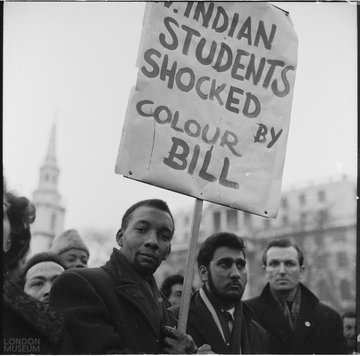
Commonwealth Immigrants Act 1962
‐
The first Act of Parliament to place significant restrictions on the entry of Commonwealth citizens into Britain
About
The Commonwealth Immigrants Act of 1962 was the first Act of Parliament to place significant restrictions on the entry of Commonwealth immigrants into Britain. The Act, which was overseen by the Conservative Home Secretary Richard ‘Rab’ Butler, implemented a voucher system for incoming migrants issued by the Ministry of Labour, which graded applicants in relation to their employment prospects. This was a clear reversal of the British Nationality Act of 1948, which allowed for the free movement of Citizens of the United Kingdom and Colonies (CUKC).
Prior to the implementation of the Commonwealth Immigrants Act 1962, there was significant concern among citizens and politicians about how many immigrants from places such as India, Pakistan and the Caribbean were entering Britain, particularly since the government did not keep an official count as Commonwealth migrants were technically British citizens. Moreover, the Governments of India and Pakistan worried that they would lose labourers who sought to work and settle in Britain. They therefore imposed strict criteria for the issuing of passports. This included a deposit of approximately £187 to cover return airfare, a working knowledge of English and the promise of work. A Home Office letter to the devolved Northern Irish Government on 24 November 1949, for example, noted that vetting migrant sponsors and ascertaining the probability of employment was necessary to minimize the number of destitute South Asians in Britain, and to reduce the number of pedlars whose work was precarious. The High Commissions of India and Pakistan worked with the British Government to support this vetting process. Despite this, some migrant men found ways to circumvent the rules imposed by the Indian and Pakistani Governments, and private agencies emerged to help facilitate the movement of South Asian migrants. In addition, there was no power to exclude South Asians who arrived in the UK with a valid passport.
The 1962 Act worked to reduce the number of racialized minority migrants settling in Britain. At a Cabinet meeting held on 10 October 1961, for example, Butler argued that the increased flow of racialized minority immigrants into Britain was a particular point of concern which required restrictive measures.
There was significant backlash to this new legislation. For example, Hugh Gaitskell, leader of the Labour Party, deemed it a ‘brutal anti-colour legislation’ and the Trinidad and Tobago activist Claudia Jones described the legislation as a ‘colour bar act’ in an article for the West Indian Gazette. In addition, the Campaign Against Racial Discrimination (CARD) was, in part, formed because of exclusionary immigration legislation. In 1964 the Act was ratified by PM Harold Wilson’s Labour government after their election victory.
Campaign Against Racial Discrimination (CARD), Conservative Party, Labour Party.
Richard ‘Rab’ Butler, Hugh Gaitskell, Claudia Jones, Harold Macmillan, Harold Wilson.
Natarajan, Radhika, ‘The “Bogus Child” and the “Big Uncle”: The Impossible South Asian Family in Post-Imperial Britain’, Twentieth Century British History 34.3 (2023), pp. 440–66
Wills, Clair, Lovers and Strangers: An Immigrant History of Post-War Britain (London: Penguin, 2018)
Commonwealth Immigrants Act 1962, https://www.legislation.gov.uk/ukpga/1962/21/enacted
CAB 128/35, Cabinet Conclusion 3, ‘Commonwealth Immigrants’, 10 October 1961, National Archives, Kew, UK
HA/8/789, Home Office Letter to the Ministry of Home Affairs in Stormont, 24 November 1949, Ministry of Home Affairs papers, Passports, Indian Pedlars, 1939–1952, Public Records Office of Northern Ireland (PRONI), Belfast
292/805.7/3/48, 'Coloured people in Great Britain': Summary of press news and comment, September 1958, University of Warwick Modern Records Centre, Warwick
For image and copyright details, please click "More Information" in the Viewer.
Image credit
A demonstration against the Colour Bar Immigration Bill, Trafalgar Square, by Henry Grant, HG2123/18, © Henry Grant Collection/London Museum, https://creativecommons.org/licenses/by-nc/4.0/
